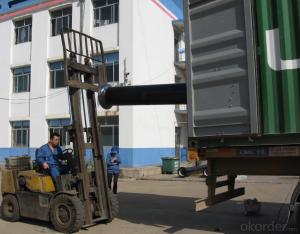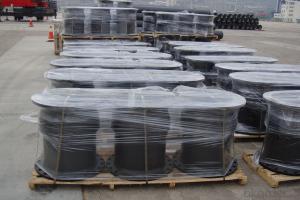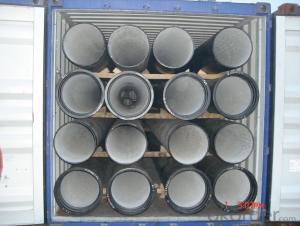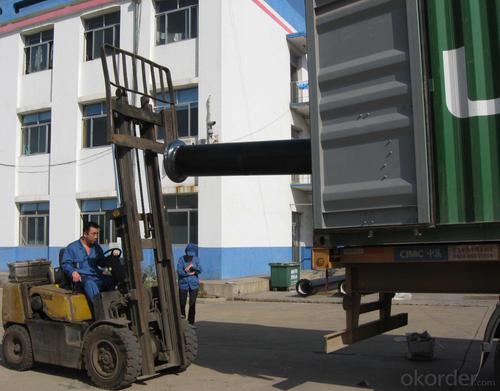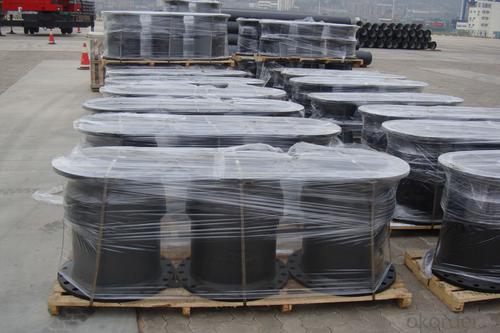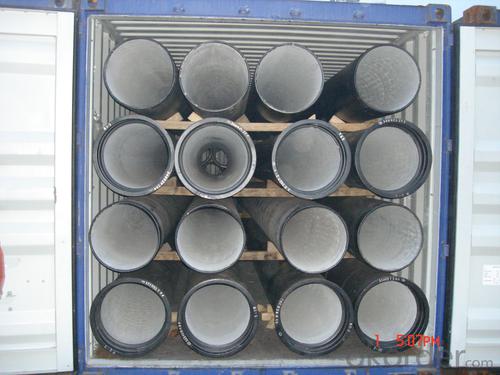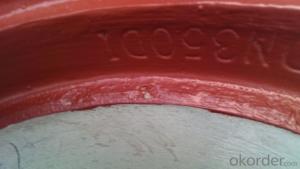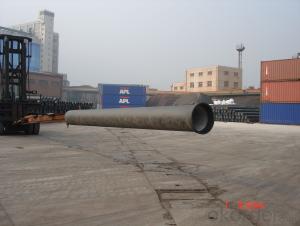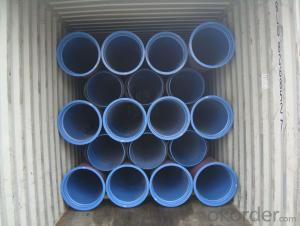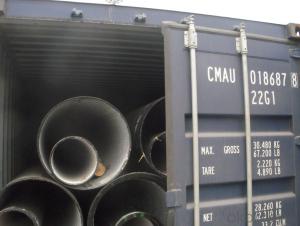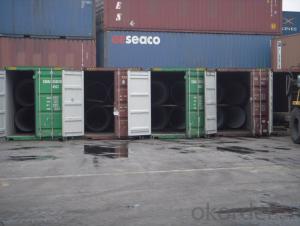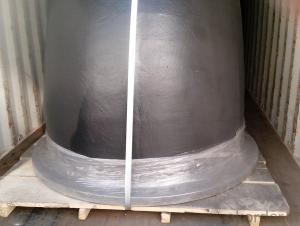DUCTILE IRON PIPES C Class DN1000
- Loading Port:
- China Main Port
- Payment Terms:
- TT OR LC
- Min Order Qty:
- -
- Supply Capability:
- -
OKorder Service Pledge
OKorder Financial Service
You Might Also Like
Ductile Iron Cast Pipe is without any defects compare with tradition casting tech, which has many advantages particularly as follow:
(1) High density. In the "vertical upward casting" process, the melt iron of centre liquid column in center crystallizer is continuously feeding for volume shrinkage caused by condensation tube at outer circumference , which lead to be free of shrinkage porosity.
(2) High purity. When melt iron pouring, the mixed impurities such as gas, dross, sand grain which are lighter than melt iron could be eliminated at furnace mouth, its impossible to enter into the crystallizer through the channel, so the melt iron into the crystallizer is very pure.
(3) Strength with toughness. The cooling speed provided by continuous crystallizer is 30 times than sand casting and 5 times than centrifugal casting, and doesn't produce white iron, the eutectic cell volume of continuous cast iron is one eighth to one tenth compare with traditional cast iron. The density of graphite nodule in ductile iron can reach 300-700 pcs/mm2. Therefore, all reason above improve the strength and toughness of continuous cast iron.
(4) Free machining. The high speed cooling make the hardening phase (such as boride, steadite) not appear like reticular, massive or thick, but diffuse like fish bone and pane in shape, moreover, there are tiny graphite flakes inlaid hardening phase. It's free machining in BrinellHardness the range of 250-300HB. However, the Brinell Hardness of 250 is top limit to common metal materials.
(5) Uniform composition of tube wall. The convection mixing of liquid column caused by marching type drawing in crystallizer make the composition of tube wall well-distributed, and concentration gradient very little.
(6) High productivity. To the wall thickness of tube under 10mm, the speed of continuous casting is 1 meter/min, to the wall thickness of tube under 20mm, the speed of continuous casting is 0.5 meter/min, which is high efficiency that centrifugal or other casting tech couldn't reach.
- Q: Can ductile iron pipes be used for underground fuel storage systems?
- No, ductile iron pipes are not suitable for underground fuel storage systems. They are more commonly used for water and sewer applications due to their strength and durability in carrying liquids. Underground fuel storage systems require materials that are specifically designed to handle the corrosive nature of fuel and prevent leaks or contamination, such as double-walled fiberglass or steel tanks.
- Q: How are ductile iron pipes protected against freeze-thaw cycles?
- Several measures are taken to protect ductile iron pipes from freeze-thaw cycles. Firstly, the material used in these pipes is naturally resistant to low temperatures, allowing them to withstand freezing conditions without becoming brittle or prone to cracking. Furthermore, a protective layer such as cement mortar lining or polyethylene encasement is often applied to the pipes. This extra barrier helps insulate the pipe and prevents direct contact between the iron and the surrounding environment, reducing the risk of freeze-thaw damage. Moreover, ductile iron pipes are designed with joints that allow for movement and flexibility. This design feature helps accommodate any expansion or contraction that may occur during freeze-thaw cycles, minimizing the risk of pipe breakage or damage caused by freezing water pressure. Proper installation practices, including sufficient bedding and backfilling, are also crucial in protecting ductile iron pipes from freeze-thaw cycles. Adequate support and suitable materials surrounding the pipes help minimize the impact of freezing temperatures on the structural integrity of the pipes. Regular inspection and maintenance of ductile iron pipes are essential for identifying any potential issues resulting from freeze-thaw cycles. Periodic assessments can detect signs of damage or deterioration, allowing for timely repairs or replacement to prevent further damage. In conclusion, ductile iron pipes are safeguarded against freeze-thaw cycles through the material's inherent resistance, protective coatings, flexible joints, proper installation practices, and regular maintenance. These measures collectively ensure the durability and longevity of ductile iron pipes, even in cold weather conditions.
- Q: What is the weight of ductile iron pipes compared to other materials?
- Ductile iron pipes are generally heavier than other commonly used materials such as PVC or HDPE pipes.
- Q: Are ductile iron pipes suitable for use in desalination plants?
- Yes, ductile iron pipes are suitable for use in desalination plants. Ductile iron is known for its high strength and durability, making it capable of withstanding the harsh conditions and corrosive nature of desalination processes. Additionally, ductile iron pipes have excellent resistance to internal and external corrosion, making them a reliable choice for transporting the high-pressure brine and freshwater in desalination plants.
- Q: What is the manufacturing process of ductile iron pipes? Thank you
- Ductile iron pipe is a pipe dream of urban water supply, gas pipelines, sets of high strength, good ductility and corrosion resistance strong strength, has the essence of iron, steel, cast iron pipe and steel pipe is a traditional popular replacement products, is a kind of widely used pressure water supply, gas and send pipes. Has the advantages of high strength, good toughness, corrosion resistance and easy device and other excellent characteristics, is the traditional grey iron and steel pipe replacement products popular, has become the preferred data of water supply, gas industry, set high strength, good ductility and corrosion resistance strong strength, has the essence of iron, steel, is the traditional cast iron pipe and steel pipe replacement products under the popular small as you introduce the ductile iron pipe is how to make the.
- Q: What is the disadvantage of nodular cast iron in excess of silicon?
- Excessive silicon control results in the formation of nodular graphite in large cross section ductile iron and reduces the mechanical properties of castings.
- Q: Can ductile iron pipe be used for agricultural irrigation systems?
- Yes, ductile iron pipe can be used for agricultural irrigation systems. Ductile iron pipe is known for its strength, durability, and corrosion resistance, making it suitable for various applications including agricultural irrigation. It can withstand high pressure and provide a reliable and long-lasting solution for transporting water in irrigation systems. Additionally, ductile iron pipe is resistant to chemicals commonly found in water sources used for irrigation, ensuring the pipe's integrity and preventing degradation over time. Its flexibility allows for easy installation and maintenance, making it a practical choice for agricultural irrigation systems.
- Q: Can ductile iron pipe be used for cooling water systems?
- Yes, ductile iron pipe can be used for cooling water systems. Ductile iron pipe has excellent corrosion resistance, high tensile strength, and is capable of withstanding high-pressure conditions, making it suitable for various applications, including cooling water systems. Its durable and versatile nature allows it to effectively transport and distribute cooling water without the risk of leakage or failure. Additionally, ductile iron pipe is known for its long service life and low maintenance requirements, making it a cost-effective choice for cooling water systems.
- Q: How does ductile iron pipe perform in areas with high seismic activity?
- Ductile iron pipe performs well in areas with high seismic activity due to its inherent flexibility and strength. Its ability to withstand ground movement and absorb seismic forces makes it a reliable choice for underground piping systems in earthquake-prone regions. Additionally, the material's high tensile strength and resilience help it resist fractures and maintain its structural integrity during seismic events, ensuring the continuous flow of water or other fluids.
- Q: How are ductile iron pipes protected against erosion caused by high-velocity flow?
- Various methods and techniques are used to protect ductile iron pipes from erosion caused by high-velocity flow. One effective method involves applying protective coatings on the inner surface of the pipes. These coatings act as a barrier between the flowing water and the pipe material, minimizing the abrasive effects of the fast flow. Depending on the specific requirements of the application, coatings such as epoxy, polyurethane, or cement-mortar lining may be used. In addition, manufacturers often design the pipes with increased wall thickness in areas prone to erosion, such as bends or sections with high flow velocity. This additional thickness provides extra strength and resistance against erosion. Another technique used to safeguard ductile iron pipes from erosion is the implementation of flow control devices, such as flow deflectors or fittings that reduce velocity. These devices help redirect the flow and decrease its speed, thus minimizing the impact on the pipe walls. Regular maintenance and inspections are also vital to prevent erosion. By monitoring the condition of the pipes and identifying any early signs of erosion, appropriate measures can be taken to address the issue before it worsens. This may involve repairing or replacing damaged sections of the pipes and implementing erosion control measures like sediment filters or flow restrictors. Overall, a combination of protective coatings, design considerations, flow control devices, and proactive maintenance strategies are employed to ensure adequate protection of ductile iron pipes against erosion caused by high-velocity flow.
Send your message to us
DUCTILE IRON PIPES C Class DN1000
- Loading Port:
- China Main Port
- Payment Terms:
- TT OR LC
- Min Order Qty:
- -
- Supply Capability:
- -
OKorder Service Pledge
OKorder Financial Service
Similar products
Hot products
Hot Searches
Related keywords
